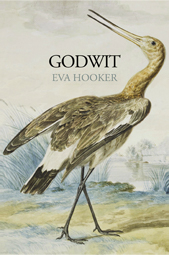Our Authors

Eva Hooker
Godwit, by Eva Hooker, is a place of meeting, a “backlit city/Of scarlet solitudes.” It reaches for loneliness and the “hand in the small/Of the back/In-folding grace”: it reaches for a “goodness that can make you blind” in “plain speech with lost rules of usage.” The book’s water metaphors are “legible footprints of matter” in-forming soul so that it has grammatical and syntactic shape. Its lake poems are “reading rooms made of water upright and edged.” The books found there fetch both writer and reader to underwater work.
Godwit begins in the mid-western prairie booming grounds and ends in the eastern tidal marshes where salt hay grows. Here place is anxious. As is body. Words taste of salt. Words of want. Of radical detachment. In the middle section, a sequence of poems imagines “the pediment of shadow,” where soul is in a place that requires “ancient guides for travel.” The last section of the book describes terra amata: the desert, the wild, the wandering sands, “the nothing that is not there/And the nothing that is.” At the last, the she of this book, must “pick her way through radiance with dirty shoes” and find her map to after.
This is an amazing book—bold, shockingly well-made. At the center of existence is a wound, in the natural order past cure. These poems respond by giving the reader ecstasy and acknowledgement and ravishment. These pages are electric. Their dress is hitched for give, indifferent to modesty. The great mystics live.
—Frank Bidart, Metaphysical Dog: Poems
Apocalyptic, awe-filled, riveting. The poems of Eva Hooker’s Godwit will leave you breathless, confounded by their lush pastoral gorgeousness juxtaposed against a grief-stricken, kaleidoscopic examination of the soul whose “haunt is wilderness.” An exciting, erratic, electrically-charged pulse runs through these poems and their startling exploration of nature, beauty, desire, and of language itself, where “Meaning is such hard country.” Hooker boldly confronts the very essence of knowledge, of life and death, in rapturous sequences that resist closure in the name of inquiry, innovation, and formal daring. The lyric ruptures, fractures in shimmering pools of grief. Never has the natural world—columbine, lady slipper, trillium, bloodroot—been so devastatingly and excruciatingly alive.
—Hadara Bar-Nadav, Lullaby (with Exit Sign)
Godwit marks a meeting place, between the long-legged bird and the prairie marsh, the back-lit city and fields of blue aster, plain speech and numinous revelation. Here sublime beauty, fraught with shadows, calls readers “to pick our way through radiance with dirty shoes.” In charged language and a strikingly modern sensibility, Eva Hooker’s eloquent poems undertake the ancient task of soul-making.
—Patricia Kirkpatrick, Odessa
Eva Hooker is Professor of English and Writer in Residence at Saint Mary’s College, Notre Dame, Indiana. Notes for Survival in the Wilderness, a hand bound chapbook, (Chapiteau Press, Montpelier, Vermont) was published in 2011. Lake Superior and Madeline Island have left their profound water-mark on the poems that make up this sequence. Her earlier chapbook, The Winter Keeper (Chapiteau Press, 2000) was a finalist for the Minnesota Book Award in poetry in 2001. Prior to her appointment at Saint Mary’s, she was Regents Professor of Poetry at Saint John’s University in Collegeville, Minnesota.

